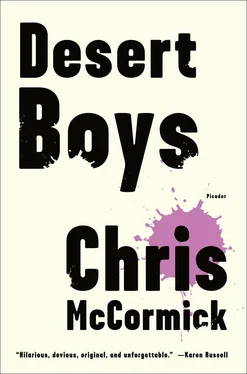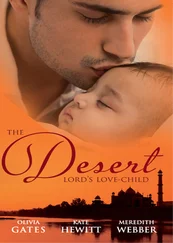Make sure, however, to call your father to inform him that he’ll have company. He’s a Midwesterner by birth and doesn’t enjoy surprises. When he, too, acts as though this — his only son bringing a man home for the first time — is not a big deal, continue to play along. One way to do so is to replace the word “you” with the word “ya,” as in, “Love ya, see ya soon.” Hang up the phone and chat incessantly with Lloyd about your hometown. Explain how surprising and uplifting you find it to have a modern, gay, et cetera, et cetera being staged in the conservative desert death-hole you so desperately attempted all your life to escape.
Drive. Allow Lloyd, whose laptop contains thirteen hundred pages of a novel about whaling, to be the poet. Let him call the I-5 “the yellow spine of California.” Let him describe the Joshua trees in the desert as dancers striking poses or deformed hands or barnacles — barnacles bunching from the smooth hull of a ship. When you’re this close to home, it’s vital you focus on the concrete — literally, almost — on, for example, watching for potholes and observing traffic signals. At a red light beside CAMACHO’S AUTO SALES, ignore the tiny triangular flags beating against one another in the wind. Keep your eyes on the light. When it turns green, feel the wind’s hold under the car and hear Lloyd say it feels as though you’re in an enormous, swirling glass of wine.
Turn right onto Comstock Avenue. Your destination is on the left. When Lloyd jokingly asks how you can tell your house apart from all the other nearly identical tract homes on the block, point to the only palm trees in town, which a neighbor had transplanted from Los Angeles, and say, “Mine’s the one across from Hollywood Boulevard.”
Recognize the bent old man examining a sprinkler head in your summer-dried front lawn: that’s your father. Pull the rental into the driveway alongside your mother’s burgundy Corolla, which, judging by the white splotches of oxidation, hasn’t been moved since she last parked it there. Do the math — almost a year. Before opening the car doors, answer Lloyd’s question. He’s had five hours on the road but waits until now to ask what he should call your father. Tell him Ed will be fine. Make that Edward.
When your father hugs you, remember the funeral at Forest Lawn. Your mother’s brother Gaspar paid for the coffin, the flowers, the space, and the alcohol. You and your father were the only men in cheap suits, and the hug between you — jackets lifted and bunched — was awkward. Afterwards you slalomed between your Armani-clad extended family to the gold-fauceted, marble-floored, ridiculous bathroom and sobbed. “You okay?” asked the towel-dispensing attendant, a Filipino man your father’s age you pretended not to see. “How about these Middle Easterns,” he said, trying to lighten the mood. Other than your long eyelashes, you look nothing like your mother, and this wasn’t the first time someone talked about Armenians as if you weren’t one of them. The attendant must have mistaken you for a member of the waitstaff, frustrated after dropping a tray of wineglasses. When you asked what he meant, he said, “That’s a lot of money to spend on the dead, no?” He passed you a hand towel, thick and soft and slippery, like a cashmere sweater. On the way out, to demonstrate that you hadn’t been affected, you tipped the attendant a dollar. As you hug your father now, allow yourself to feel angry at that man, for making that one dollar what you think of when you think of your mother’s funeral.
Get over it — you have work to do. Introduce your father to Lloyd, and take a look at them as they shake hands to see what kind of first impressions they make. Your father is in his early sixties, hair the blond-gray of mummies. Otherwise, he looks healthy: he’s lost weight, and he’s wearing a new (creases still intact) polo shirt tucked into slacks. As for Lloyd, you’d convinced him to shave his green-dyed goatee and to discard his usual “à la David Foster Wallace” bandanna, but the rest was his choice — tight white jeans tucked into ’90s-style high-tops; a forest green deep-V; a decorative, lightweight navy scarf sporting white polka dots in the shape of terriers. The pale skin on his face is purple in the two spots where the sun comes through his tinted glasses. You hate those glasses. Hold your applause when he removes them. As he introduces himself, notice his lisp—“Greetingss, Misster Kushner”—for the first time in years.
Examine your father’s tone as he compliments Lloyd’s terrier scarf.
Follow the men into your childhood home. The living room is decorated almost exclusively with porcelain angels, the one exception to your mother’s hatred of the gaudy. Female angels in ballet poses, baby angels lifting children over a fallen bridge, male angels farming wheat — from the glass-encased shelves of curio cabinets, from the white-flecked bricks of the mantel, and from the sills of windows narrow and wide, the multitudes sing.
On the coffee table sit three plastic bottles of water and a bowl of pizza-flavored Chex Mix, the extent of your father’s efforts as host. Your mother would’ve sliced and salted cucumbers, tomatoes, and cheese. Flat, skinlike bread would splay in the belly of a wicker basket. Mention, in a light mood, your father’s relative ineptitude, and listen as your father agrees that yes, your mother was better than he, in more ways than this.
When Lloyd says the scene reminds him of a novel called The Left-Handed Woman, try to change the subject immediately. Your father is in the business of selling furniture. He does not want to talk about literature. Still, try to remember why you’re here. Have compassion. Take a seat with Lloyd on the floral couch you once wet as a child, and listen.
Watch Lloyd scoot forward on the cushion. “Well,” he says, “it’s about a couple — a hetero couple — and the woman, you guessed it, is left-handed. When she leaves, the man has to go to his cupboard and turn all the mugs so that the handles are on the right side. Isn’t that something?”
Now you’re depressed, but your father, having fallen into his favorite recliner, calls the image “lovely.” Conceal your confusion. Avoid asking aloud why this trip is going so smoothly.
Brace yourself when your father asks Lloyd about his novel, which you neglected to notice Lloyd mention just a moment ago, while you were busy concealing your confusion and avoiding et cetera, et cetera.
Watch Lloyd scoot even farther forward on the couch, so that the cushion comes up at a forty-five-degree angle behind him. As you listen to him talk, imagine the world of his novel entering the living room — Ottoman whalers, Argentine pirates, a Dixieland jazz band lost at sea after a New Orleans flood (working title: Moby Dixie ). See these figments rush into the living room alongside the chorus of angels presiding over the father, the son, and the ridiculous boyfriend.
When your father responds by praising “the mind of a real writer,” resist the urge to defend blogging. Instead, offer an inquisitive smile as Lloyd asks your father if he’s ever done some writing of his own.
You’re surprised to hear he has. He understands the two of you are out this way to see a play. Well, a million years ago, when he was a member of his high school drama club in Dearborn, Michigan, he happened to write a few plays himself, believe it or not. Choose not to believe it, and then doubt your doubt as he goes on to say he probably has an old typewritten script stashed in a box somewhere in the garage.
Smile, smile, smile while Lloyd suggests the three of you spend the remaining daylight digging for the manuscript. Keep to yourself not only your skepticism regarding the prospects of finding the play but also your questions regarding what will be done with the play if it were, by some miracle, to be found.
Читать дальше












